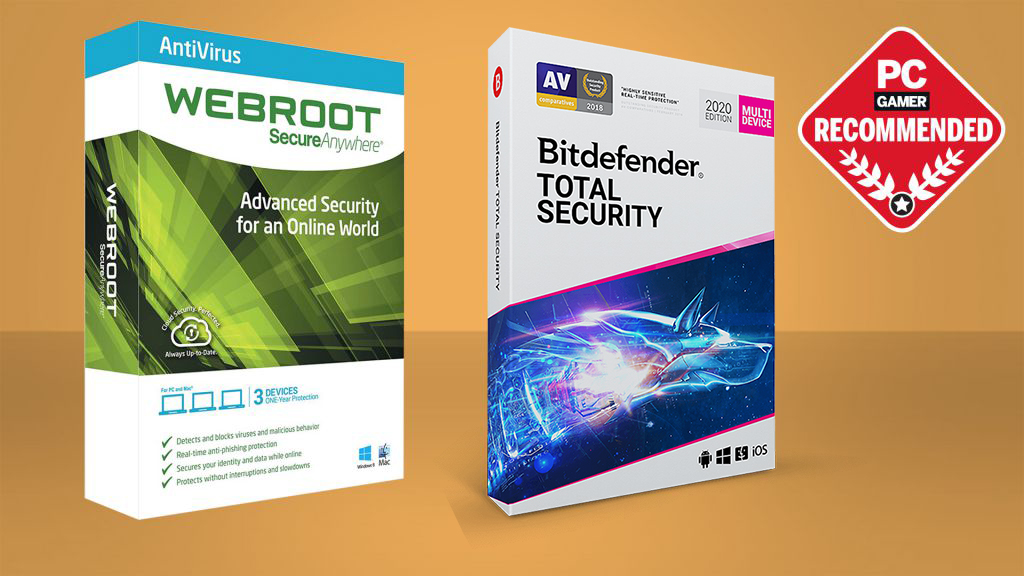The best antivirus for PC gaming

I know it's no fun tracking down the best antivirus programs for PC gaming. Let's face it, even though it can feel like a chore, it's probably one of the most important investments you can make. Imagine spending all the time and money on building your perfect high-end gaming PC only to have your pride and joy ruined by some sinister malware from some questionable websites that you may or may not have visited (no judgments here). The best antivirus program will protect your data and keep your system clean of garbage that could slow down your rig or even worse, put your personal information at risk.
If you're just seeking our top pick, then look no further than Bitdefender, one of the best antivirus programs on the market and offers a high level of security. That being said, if you're on a budget and still want protection, Avira Free Antivirus Software is a great choice if you don't mind putting up with some ads.
Our guide below breaks down the best antivirus software out right now, so take a look and see which one works for you. There's really no excuse why you shouldn't protect yourself, even if some nibble a little bit of your overall performance away.
Bitdefender Total Security 2020
Reasons to buy
Reasons to avoid
While there many capable antivirus programs on the market. The best antivirus for gaming can do its job without hindering your performance or being too intrusive in your day-to-day use. What makes Bitdefender so good is that once it's installed in immediately goes into Autopilot mode by default. Autopilot makes all the security-related decisions so you don't have to based on your usage patterns so you're never bombarded with alerts and notifications. In contrast, you still have an unparalleled level of control with Bitdefender.
One of our favorite things about Bitdefender can scan for any active vulnerabilities in your PC whether it be out of date software, missing Windows Updates and even analyze the strength of your passwords in an easy to read reports. It has its own VPN and improved parental controls in case you have a kid who uses your PC. We rarely ever see antivirus programs go the extra mile such as Bitdefender.
Kaspersky Anti-Virus 2019
Reasons to buy
Reasons to avoid
As much as we like Bitdefender, there are other capable security suites out there. Kaspersky Internet Security is one of them, and in this instance, we recommended paying the upcharge for Kaspersky Total Security, a more fleshed out package with some handy utilities instead of just fluff.
Among the additional grab bag of goodies is a file shredder that overwrites deleted files so they're near impossible to restore, the ability to create encrypted folders to keep sensitive files from prying eyes, password syncing among multiple devices, and PC clean-up tools, to name just a few. You can find free alternatives to all of these, but having them all in one place is convenient.
The biggest gaming news, reviews and hardware deals
Keep up to date with the most important stories and the best deals, as picked by the PC Gamer team.
One reason we like Kaspersky because it consistently performs among the best AV programs, both in terms of identifying and blocking malware, and having a minimal impact on system performance. That's not to say it's perfect—we recall one particularly annoying incident where Kaspersky had let a potentially unwanted program (PUP) lock our mouse cursor in a box. It took some persistence (and Safe Mode) to fix the problem. For the most part, however, Kaspersky is very good about protecting PCs. Even on the rare occasions we've run into problems, they've been relatively minor.
Most users will find Kaspersky's default settings adequate, but if it's fine grain control you're after, you'll find plenty of it within the many submenus. There are even submenus within submenus. For example, in settings you can dive into the antivirus menu for file scanning and choose a security level (low, medium, or high), or dig even deeper by clicking on Advanced Settings to bring up more options. There are even submenus within that submenu. The downside is that it can take several clicks to dig your way to a specific setting, but it's better than having no control at all.
Webroot SecureAnywhere
Reasons to buy
Reasons to avoid
When Webroot approached us several years ago about a nimble security product that existed almost entirely in the cloud, we couldn't help but roll our eyes. The level of hype that followed felt like a marketing schtick—here was this new AV program that was supposed to install in under 10 seconds and barely help itself to RAM or storage, yet provide adequate protection on the level of much bigger security suites. Yeah, right!, we thought. But here's the thing, Webroot was right.
SecureAnywhere was and still is a remarkable outlier in AV. It takes up just a few megabytes of disk space and uses about 5MB of RAM when idle. During an active scan, Task Manager shows SecureAnywhere using around 50MB of RAM and less than 15 percent CPU utilization, yet takes just a couple of minutes to scan 150GB of data spread across two SSDs.
Webroot also makes a special version of SecureAnywhere for gamers. It differs from the regular version in that it offers a system optimizer tool to "analyze your devices and the operating systems to detect system issues, wipe away all traces of online activity, and make deleted files unrecoverable." In practice, we only saw it delete temporary files to free up some disk space. SecureAnywhere also politely stays in the background so you're not bothered by updates or added lag when playing games.
Since it's cloud-based, SecureAnywhere works best when there's an Internet connection. In the era of ubiquitous broadband, that's not going to be a problem for many people, particularly gamers. And though it's lightweight and short on local storage requirements, SecureAnywhere is surprisingly high on adjustable settings. There's well over 100 of them, and you can export your settings to make setup on another PC quick and easy.


